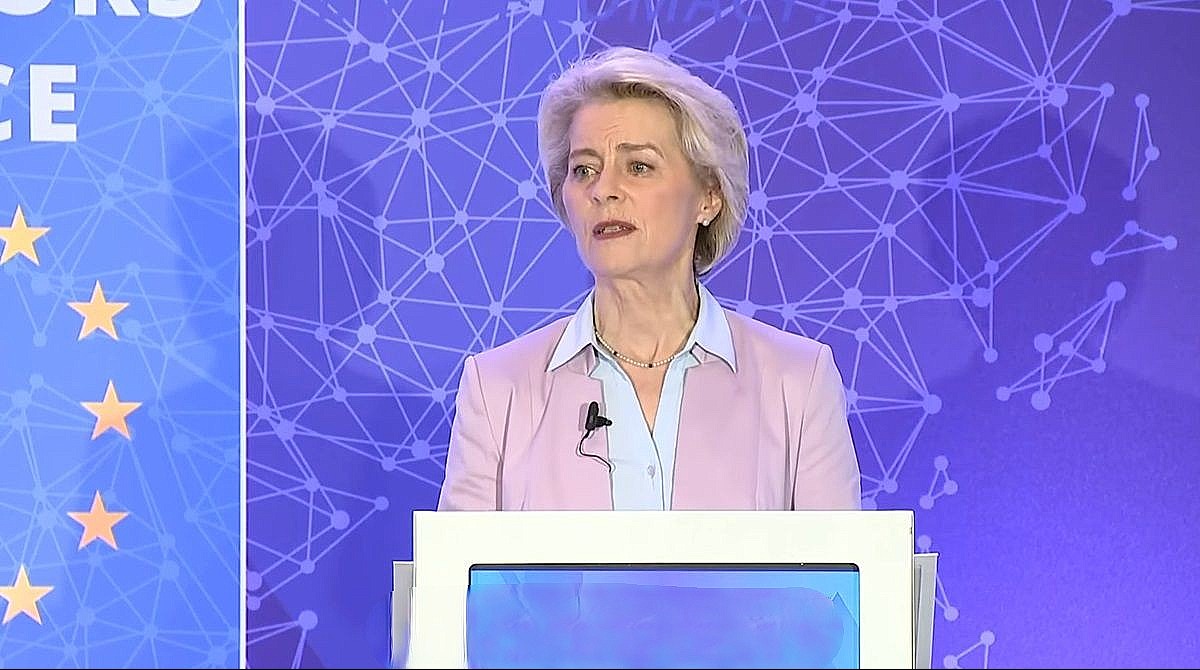President Ursula von der Leyen of the European Union has come under intense scrutiny and criticism for her alleged pro-Israel bias, sparking widespread calls for her resignation from numerous member states of the EU. These calls have been echoed by prominent political figures and have even led to a petition gathering over 62,745 signatures. The central point of contention revolves around President von der Leyen’s unequivocal support for Israel, a stance that has left several EU countries, such as Spain and Ireland, deeply unhappy, as they perceive her as not adequately representing their opinions or the EU’s broader stance on the conflict. Furthermore, the fact that neither Palestine nor Israel is a member of the European Union raises questions about why she appears to favor one nation over another.
Von der Leyen’s speech at the EU Ambassadors Conference yestereday, became a focal point for criticism due to her stance on the war in Gaza. In her speech, von der Leyen made statements that many perceived as non partisan and aligning all of the EU in support for Israel, while appearing to downplay the bombing of the Israel Defense Force (IDF). One of the most contentious remarks was her call for Israel to be “as targeted as possible, because every human life matters.” While this statement may sound noble at first glance, it raised eyebrows and crtiticism among those who closely monitored her words and specifically her body language and micro expressions.
Von der Leyen’s apparent insincerity was particularly evident when she said, “Every human life matters,” as she was observed shaking her head in disagreement while maintaining a stiff upper lip. The stark contradiction between her words and her body language prompted speculation about her true sincerity. Many argue that such incongruities can undermine trust and credibility, especially when she holds a position of significant influence within the European Union.
Spain, for instance, has consistently advocated for a two-state solution and has criticized Israel’s actions in the occupied territories. Ireland has gone farther, in 1980, it was the first European Union member state to endorse the establishment of a Palestinian state. Prominent political figures from various member states have also joined the chorus calling for President von der Leyen’s resignation. They have all expressed concerns that President von der Leyen’s stance may compromise the EU’s credibility as a mediator bewteen the two states and hinder their diplomatic efforts.
The contentious stance not only affects the EU’s diplomatic efforts but also raises concerns about the objectivity and neutrality of the European Union’s leadership. A leader who openly supports one side in such a sensitive issue may hinder the EU’s credibility as a fair and impartial mediator.
When the leader of a supranational organization like the European Union demonstrates a clear bias toward one party in a highly sensitive geopolitical conflict, it can have significant consequences. A partisan leader can undermine the EU’s credibility as an impartial mediator, making it difficult to garner the trust of all parties involved in the Israeli-Palestinian conflict. This, in turn, can hinder the EU’s ability to play a constructive role in peace negotiations and diplomatic efforts.
The ongoing controversy serves as a reminder of the importance of balanced and neutral leadership when dealing with sensitive international conflicts. The ability to mediate and navigate complex geopolitical issues hinges on the credibility and trustworthiness of the leaders involved. In this case, many believe that President von der Leyen’s perceived bias has eroded that credibility and trust, making her continued leadership a subject of heated debate within the European Union.









